The new policy aims to increase Electric Vehicles to 10 percent in new vehicle registrations by 2025 in the state of Maharashtra.
The Maharashtra government announced its new Electric Vehicle (EV) policy on Tuesday which has updated the one announced in 2018 by the Fadnavis government, it was released by Additional Chief Secretary (Transport) Ashish Singh and state environment minister Aaditya Thackeray.
Maharashtra has remained low on the EV policy and so now the state has revised its policy again, which provides greater incentives to battery electric vehicles (BEVs) and develops a good infrastructure to promote their sales.
The aim of the new policy is to increase the share of EVs to 10 percent in the new vehicle registrations by 2025. To put it simply, the Maharashtra government has set a target for electric vehicles to take over 10 percent of total two-wheeler registrations, 20 percent of total three-wheeler registrations, and 5 percent of total four-wheeler registrations by 2025.
Also read: 50% Of BJP Legislators In UP Have Three Or More Children
This policy also aims to share 25 percent of Electric Vehicles in public transport in Mumbai, Pune, Aurangabad, and Nashik. By 2025, the Maharashtra State Road Transport Corporation (MSRTC) targets to convert 15 percent of its current public buses to electric as well.
The state government plans to set up 2500 charging stations across Maharashtra. At least one public charging station in a 3 km x 3 km grid or a minimum of 50 charging stations per million population will be set up. The city-wise targets of public and semi-public charging stations by 2025 are- Greater Mumbai urban area (UA): 1500, Pune UA: 500, Nagpur UA: 150, Nashik UA: 100, Aurangabad UA: 75, Amravati: 30, and Solapur: 20.
Unveiling Maharashtra’s Electric Vehicle Policy! pic.twitter.com/oPj4khvhIS
— Aaditya Thackeray (@AUThackeray) July 13, 2021
For long-distance electric vehicle charging on highways, the state will set up public charging stations at a 25 km distance on both sides of the highways. These stations should cater to the charging requirements of vehicles like e-buses, electric trucks, and other EVs. Also, starting April 2022, all new government vehicles (owned or leased) operating within the major cities will be made electric.
According to the policy, electric vehicles will get incentives till the policy is in force. Other than EVs, the government will also give incentives to the charging infrastructure. Therefore, public and semi-public charging stations will be eligible for incentives.
The state government will also encourage financial institutions and banks to offer preferential interest rates on electric vehicles like e-autos, goods carriers, and taxis. Tax rebates will also be provided to home owners and societies if they set up EV charging stations.
As an independent media platform, we do not take advertisements from governments and corporate houses. It is you, our readers, who have supported us on our journey to do honest and unbiased journalism. Please contribute, so that we can continue to do the same in future.

